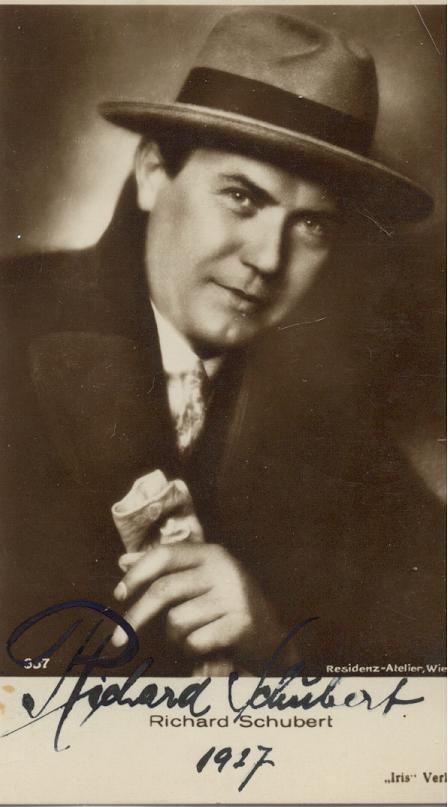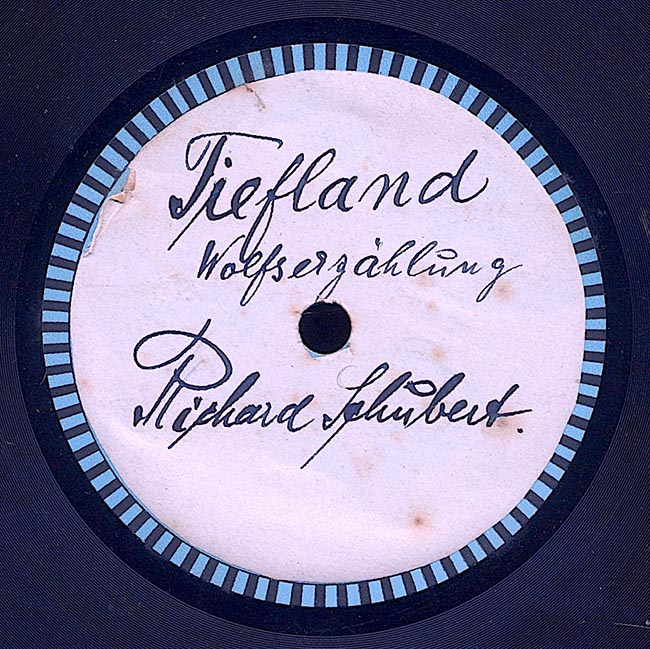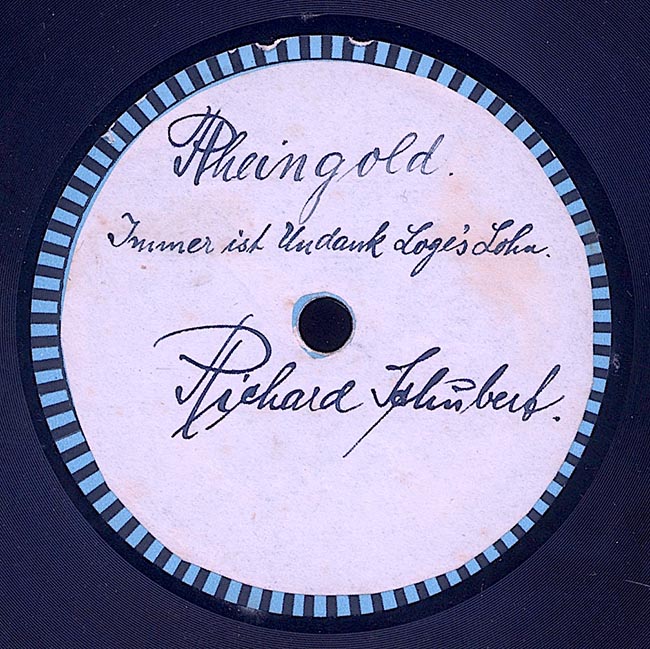Richard Schubert
The two sides of the above record are a bit mysterious. The long article on Schubert in Stimmen, die um die Welt
gingen (see quote below) lists them as private recordings made on the occasion of a visit to the UK. Now upon hearing them,
this is clearly wrong: they're Schubert's commercial 1920 recordings of these two arias – albeit with labels hand-written
by Schubert himself, and in the case of the Tiefland selection, with an added introduction spoken by Schubert (ill-cut and hence
incomprehensible at the start, which consist of just a few scraps of what Schubert said). That seems to be a private edition for
Schubert's friends & family, made several years later than the recordings (the spoken introduction is electrically recorded, and
without the electrical process, it would also have been impossible to add anything to an already existing recording).
Infinite thanks to Anton Bieber for providing these rarities!
In RA format
Biographical notes
|
Richard Schubert was born on 15 December 1895 in Dessau.
He made his debut in 1909 in Strasbourg as a baritone.
For one year, he sang minor parts. After one year, Schubert
resumed vocal studies with Rudolf von Milde and with
Vanzo in Milano.
Schubert made his tenor debut in Nürnberg in 1910:
on 1 September 1910, he sang the
First Nobleman from Brabant, in Lohengrin.
Other roles included Baron Friedrich (Mignon), Spoletta, Ruiz,
Fenton (Die lustigen Weiber von Windsor), Erster Geharnischter,
Jonas (Le prophète with Bolz), Walther von der Vogelweide
(Tannhäuser with Bolz), Zorn (with Knote as Stolzing),
and Hugo von Ringstetten (Undine).
Schubert soon sang his first major parts: Erik on 9 October
1910 and Lohengrin on 15 November 1910. During his first year,
Schubert sang also: Gustav (Die beiden Schützen), Der Gesandte
(Der Vagabund und die Prinzessin), Der Haushofmeister der
Kurfürstin von der Pfalz (Der Trompeter von Säckingen), Froh,
Junger Seemann, Oberon and Hüon, Willem Krouwevliet
(Die geschiedene Frau), Alfred and Don Basilio.
On 5 January 1911, Schubert sang Faust (with Sigrid Arnoldson).
On 27 January 1911, at the local premiere of the Rosenkavalier,
Schubert sang both Haushofmeister and Wirt. On 1 February 1911,
Schubert sang his first Don José, followed by Max (12 March 1911) and
Florestan. In the first German performance of Massenet's Don
Quichotte, Schubert sang Juan with Bender as the Don.
He added further roles during his first year: Hoffmann,
Baroncelli (Rienzi). At the end of the season, Schubert
participated at different galas in Lohengrin
(Second Nobleman from Brabant, with Hensel), Il barbiere di
Siviglia (Officer, with Wirl), Die Meistersinger von Nürnberg
(Zorn, with Vogelstrom)
During his third season in Nürnberg, Schubert's parts were:
Erik, Max, Stolzing, Walther von der Vogelweide, Froh,
Duca di Mantova, Manrico, Alfredo, Riccardo, Don José,
Faust, Léopold, Assad, Hoffmann, Königssohn (Königskinder),
Ferraud (Oberst Chabert), Sinodal (Demon) and Leutnant
(Der Faktor)
In 1913, Schubert moved to Wiesbaden for four years. After Wiesbaden, Schubert went to Hamburg, where he
stayed until 1928. He had sung previously there as a guest
on 2 December 1916 in Aida. He made his official debut
as permanent member in Hamburg in December 1917 as Raoul,
with Kipnis as the Third Monk. Next came Stolzing (with
Lattermann as Sachs), La bohème, La traviata, Die Zauberflöte,
Barbier von Bagdad, Faust, Tristan, Armer Heinrich (Pfitzner,
1920), Enrnest de Tressailles (Revolutionshochzeit by d'Albert,
1929), Hans Lobesang (Caecilie by Oberleitner), Kreuzzugsprediger
(Ilsebill by Klose), Petro Topola (Der heilige Morgen by Platen),
Paul (Die tote Stadt, 4 December 1920), Alfonso (Violanta).
From 1920 to 1929, Schubert made guest
appearances in Vienna. In April 1920, he sang Radamès,
Stolzing, Pedro, Tannhäuser. He participated in a Ring
in June 1920 (Loge, Siegmund, Siegfried).
He sang in Vienna about 300 performances, about 200 of which
were of Wagner operas. Further roles in Vienna: José, Canio, Bacchus,
Kaiser, Radamès, Paul, Grigorij and Otello.
Schubert also made guest appearances in München,
Dresden, Zoppot, Düsseldorf; outside the German speaking countries,
in Paris, Barcelona, Chicago, Buenos Aires. Despite his excellence
in Wagner parts, Schubert never sang in Bayreuth. In 1927,
all that Wagner singing began to take its toll: a severe vocal crisis set in. Despite taking a
rest, Schubert could never fully recover his voice.
In Hamburg, he only appeared in a reduced number of performances
and in Vienna after 1930, he only appeared two or three times per
season. Schubert started to appear more often in operetta: Die
lustige Witwe (Danilo), Marietta. In Hamburg, his last performance
was on 9 March 1936 as Tannhäuser. In Vienna, he appeared
as Eisenstein on 15 February 1937 for the last time. For a few years, he worked as a stage director in Osnabrück.
He passed away on 12 October 1959 in Oberstaufen.
Schubert recorded 26 sides for Grammophon/Polydor.
Schubert's repertory
Fra Diavolo, Fidelio, Norma, Carmen, Der Barbier von Bagdad, Die Revolutionshochzeit (by d'Albert), Tiefland, Die toten Augen
(by d'Albert), Die geschiedene
Frau (by Fall), Iphigénie en Aulide, Die Königin von Saba, Faust, La Juive (Léopold, Éléazar),
Königskinder, Ilsebill (by Klose),
Die tote Stadt, Violanta (by Korngold), Das Leben des Orest (by Krenek), Die lustige Witwe, Pagliacci, Die beiden Schützen
(by Lortzing), Undine, Der Faktor
(by Lvovský), Don Quichotte, Les huguenots, Le prophète, Robert le diable, Le nozze di Figaro, Die
Zauberflöte (Erster Geharnischter, Tamino), Boris Godunov, Der Trompeter von Säckingen, Die lustigen Weiber von
Windsor, Caecilie (by Oberleithner),
Les brigands (by Offenbach), Les contes d'Hoffmann, Der arme Heinrich (by Pfitzner), Das Herz (by Pfitzner), Die Rose vom
Liebesgarten (by Pfitzner), Der heilige Morgen (by Platen), Csavargó és királyleány/Der Vagabund
und die Prinzessin (by Poldini), La bohème, Madama Butterfly, Tosca (Spoletta), Il barbiere di Siviglia (Ufficiale),
Demon, Samson et Dalila, Wilhelm Tell (Schiller's
drama!!), Mona Lisa (by Schillings), Der Schatzgräber (by Schreker), Marietta (by Oscar Straus), Die Fledermaus (Alfred,
Eisenstein), Die
ägyptische Helena, Ariadne auf Naxos, Elektra, Die Frau ohne Schatten, Der Rosenkavalier (Haushofmeister, Wirt), Salome
(Herodes),
Mignon (Friedrich), Aida, Un ballo in maschera, Otello, La traviata, Il trovatore (Ruiz, Manrico), Rienzi (Baroncelli, Rienzi),
Der fliegende Holländer (Erik), Tannhäuser (Walther von der Vogelweide, Tannhäuser), Lohengrin (First and Second
Nobleman, Lohengrin), Tristan und Isolde (Seemann, Tristan), Die Meistersinger von Nürnberg (Zorn, Stolzing), Das Rheingold
(Froh, Loge), Die Walküre, Siegfried, Götterdämmerung, Parsifal, Oberst Chabert (by Walthershausen), Abu Hassan
(by Weber), Der Freischütz, Oberon (Oberon, Hüon).
|
Reference: Stimmen die um die Welt gingen, no. 27, March 1990
|


